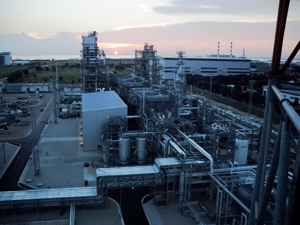U.S. Department of Energy invests $31 MM to advance carbon capture and storage for natural gas power and industrial sectors
The U.S. Department of Energy’s Office of Fossil Energy and Carbon Management announced more than $31 MM in funding for 10 projects to develop carbon capture technologies capable of capturing at least 95 percent of carbon dioxide (CO2) emissions generated from natural gas power plants, waste-to-energy power plants, and industrial applications, including cement and steel. Deploying these technologies in the power and industrial sectors at commercial scale is needed to advance the Biden-Harris Administration’s goal of a carbon pollution-free power sector by 2035, and a net-zero greenhouse gas economy by 2050.
“Carbon capture technology plays an enormously important role in helping to achieve the deep carbon reductions we need as our energy and industrial sectors transition to net-zero emissions,” said Brad Crabtree, Assistant Secretary for Fossil Energy and Carbon Management. “Today’s investment will support the technological advancement and cost reductions required for widescale deployment.”
DOE’s National Energy Technology Laboratory (NETL) will manage the 10 selected projects. The projects will support development and testing of transformational carbon capture materials, equipment, and processes for applications in natural gas combined cycle (NGCC), waste-to-energy power generation and the industrial sector. Other projects will perform front-end engineering design studies for industrial plants and NGCC power plants integrated with carbon capture systems.
Along with selections announced in October 2021, FECM has invested a total of $76 MM in 22 research and development, front-end engineering design, and engineering-scale projects at natural gas power, waste-to-energy, and industrial facilities as part of DOE’s overall efforts to decarbonize our existing infrastructure to help achieve the Biden Administration’s climate goals.
FECM funds research, development, demonstration, and deployment projects to decarbonize power generation and industrial production, remove carbon dioxide from the atmosphere, and mitigate the environmental impacts of fossil fuel production and use. Priority areas of technology work include carbon capture, carbon conversion, carbon dioxide removal, carbon dioxide transport and storage, hydrogen production with carbon management, methane emissions reduction, and critical minerals production. To learn more, visit the FECM website, sign up for FECM news announcements and visit the NETL website.







Comments